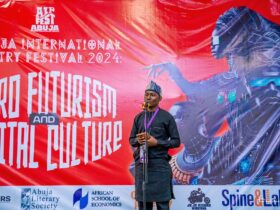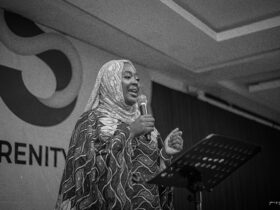Konya Shamsrumi: What is the process of writing a poem like for you? Is it a lot of hard work or easy?
Sabah Carrim: It depends on the subject, on the moment, on my state of mind, on the extent of passion I have for what I want to write.
I feel there’s something instinctive and spontaneous about writing poems. It’s different from the times I’ve applied myself to writing short stories and novels. “A short story is structured; a poem pours” is how I once described it in a poem called My World. I believe that I am merely a medium present in the flow of everyday things, whose role is just to be there to capture the thought or idea that flits through my mind at that particular moment. That’s why ever since I started writing poems it became a necessity to carry a notebook at all times. To be that agent.
I feel that if I don’t capture the moment, I will lose the spontaneity that accounts for the smoothness of thoughts, ideas, and language making up a good poem.
Konya Shamsrumi: Please describe your sense of identity in this or any possible world in imagery or metaphor?
Sabah Carrim: In having travelled widely, and lived in many countries, I often feel I belong nowhere, having no place I can call home. I feel my purpose is to capture moments, capture conversations I have with people I cross paths with, seeking a connect with the most exciting—as well as the most dull—because everyone has a story. The ordinary ones are usually the most exciting because they haven’t fought their contradictions, they haven’t tried to give that fake appearance of integrity and coherence that the rest learn to disguise themselves with.
I have always been drawn to the persona of a gypsy. In the French literary context, the closest reference would be Esmeralda of Notre Dame de Paris, who is both wise and naïve, and a set of many contradictory character traits that she is aware of and embraces, and who manages to grasp the essence of a situation very quickly, what matters and what doesn’t about it, so sensitive is she by her nature, by the ups and downs she has endured, and by the empathy she is capable of demonstrating towards the many different archetypes of people she meets.
In the Bollywood context, I recall the movie Zubeidaa, specifically the song Main Albeli by AR Rehman, where the character recounts the story of a woman who moves around on her own (‘where the mad winds take her’, ‘here one moment, there the next’, ‘ a traveller without a destination’), a mystery to many and to herself, capable of absorbing and emitting the colours the world has on offer (‘a hundred shades of dawn and dusk’) as a result of her experiences, her innocence, but particularly her openness to the world; sometimes she’s dew, sometimes a flame, eternally restless.
Konya Shamsrumi: If any of your poems could literarily save a person’s life, which poem would it be and can you describe the person whose life you think it would have saved?
Sabah Carrim: Thinking that any of my poems would ‘save a person’s life’ would be rather pretentious!
I do feel however that certain poems I write seek to reassure a certain type of reader that he or she is not alone in the struggle of ‘feeling constantly different’, disconnected, aloof from everyone, especially when he or she has the ability to see things other people don’t or can’t which only exacerbates his or her—our— isolation.
That our enemy is really ‘the numbers’ in any situation, where our voice is drowned by those who outnumber us, who make us feel bad about who we are, how we feel, especially how we put so much into question, and seek depth and intensity in the way we engage with the world—something that often ends up irritating everyone around us.
In the end, these very ‘numbers’ increase our unease with existence, even if we are often right, often legitimate in feeling what we feel, thinking what we think.
Most of my poems are based on this theme, and this pervasive thread is most apparent I believe, if my poems are read as a collection.

Konya Shamsrumi: What does Africa mean to you, as potential or reality?
Sabah Carrim: Africa is a vast continent with a diversity that is regrettably overlooked by those who live outside it, or haven’t had the privilege to experience it.
Africa is not a country. I say this because I feel that many outside it, ignorant as can be, believe that, and tend to diminish what it is. Africa is a continent with a lot of untapped potential—But that’s a cliché.
Let’s be honest: Africa is a mixture of high standards and mediocrity, like everywhere else, but because we attract the pity and sympathy of the world for our history, for what our people have endured, the mediocre among us feel entitled to the hard-won privileges of those with high standards. That shouldn’t be the case.
It’s time we turned our backs to the much-needed pity and sympathy we attracted when we first started gaining recognition as a continent with our own uniqueness, our talent, our diversity.
Now’s the time in the course of our evolution for the mediocre to be told they’re mediocre, and for us to be honest to one another about it, because in doing so, we will at least give people in that category an opportunity to better themselves at what they do.
It won’t be easy.
Because this sense of entitlement, and this practice of giving credit to the mediocre has become universal in our day and age, and extends beyond Africa.
Let’s remain focused on our goals, and let’s work towards the upkeep of standards because we have so much to offer one another as well as the rest of the world. Let’s not compromise.
Konya Shamsrumi: Could you share with us one poem you’ve been most impressed or fascinated by? Tell us why and share favorite lines from it.
Sabah Carrim: There are many—but let me pick one of the first that marked me when I was a young teenager. It’s a poem that has everything I deem necessary to reinforce the notion that choosing to be a writer, to be anything for that matter but a master at it, is going to be a trial of endurance, because (sorry to reiterate a cliché) good things come with perseverance, and let me add: a little bit of luck.
Here’s the poem:
Going All The Way by Charles Bukowski If you’re going to try, go all the way. Otherwise, don’t even start. If you're going to try, go all the way. This could mean losing girlfriends, wives, relatives, jobs and maybe even your mind. It could mean not eating for three or four days. It could mean freezing on a park bench. It could mean jail. It could mean derision, mockery, isolation. Isolation is the gift. All the others are a test of your endurance, of how much you really want to do it. And, you’ll do it, despite rejection and the worst odds. And it will be better than anything else you can imagine. If you’re going to try, go all the way. There is no other feeling like that. You will be alone with the gods, and the nights will flame with fire. DO IT. DO IT. DO IT. All the way You will ride life straight to perfect laughter. It’s the only good fight there is.
Sabah Carrim has authored two novels, Humeirah and Semi-Apes, both set in Mauritius where she was born. Her short stories have been shortlisted in various international competitions such as the Bristol Short Story Prize, AfroYoung Adult Competition, Not-So-Normal-Narrators Contest, Small Islands Anthology Contest, and the Gabriele Rico Challenge for Creative Nonfiction.
She’s also an academic with a PhD in Genocide Studies, and is currently recipient of the W. Morgan and Lou Claire Rose Scholarship and the Arch and Stella Rowan Foundation Scholarship for a MFA in Creative Writing in United States of America.
Twitter: Sabah Carrim (@SabahCarrim)












Leave a Reply